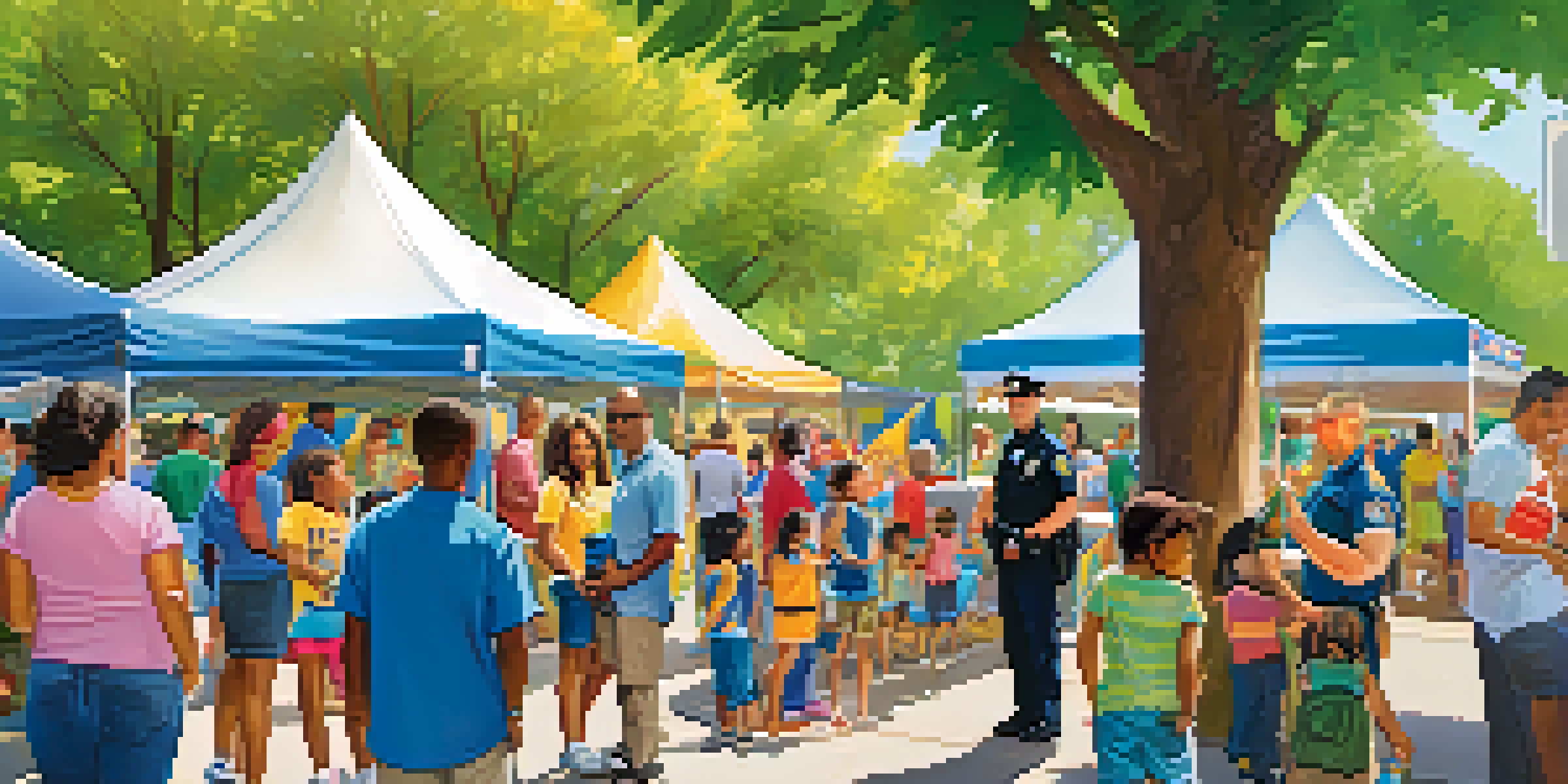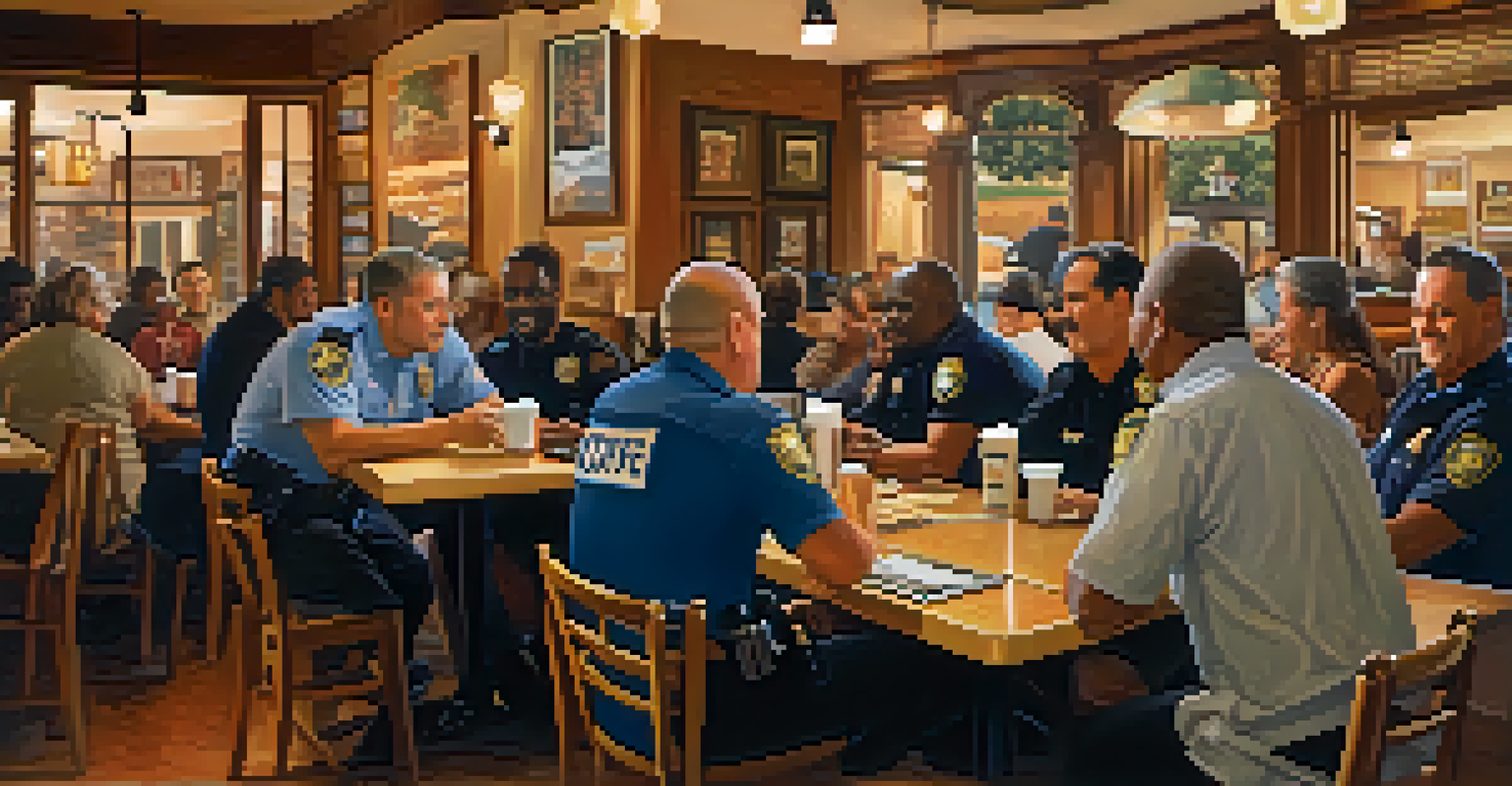Building Relationships with Law Enforcement in Santa Monica

Understanding the Role of Law Enforcement in Our Community
Law enforcement officers play a crucial role in maintaining safety and order in Santa Monica. They are not just enforcers of the law but also community members who share the same concerns and aspirations as residents. Understanding this multifaceted role can help bridge the gap between police and the community, fostering a sense of collaboration.
Law enforcement officers are not just here to enforce the law; they are part of the community they serve and protect.
By recognizing that officers are involved in various community initiatives, such as youth programs and public safety events, we can appreciate their commitment beyond just enforcing the law. This understanding can help residents see them as allies rather than adversaries, which is essential for building trust.
Engaging in open dialogues about their challenges and daily experiences can humanize officers in the eyes of the community. This connection can lead to mutual respect and a stronger partnership that enhances public safety and community well-being.
Creating Open Lines of Communication with Local Police
Effective communication is the cornerstone of any healthy relationship, including those with law enforcement. Residents should feel encouraged to voice their concerns, ask questions, and provide feedback. Establishing regular community meetings or forums can create a platform for these discussions.

Additionally, utilizing social media for outreach can strengthen these communication channels. Police departments can share updates, safety tips, and community events, while residents can engage directly with officers in a more informal setting. This transparency fosters trust and encourages community involvement.
Building Trust Through Communication
Open dialogues between law enforcement and residents foster mutual respect and enhance community safety.
Moreover, when people know they can communicate openly with their local police, it reduces the stigma often associated with reporting crimes or issues. A community that feels heard is more likely to collaborate with law enforcement, creating a safer environment for everyone.
Participating in Community Policing Initiatives
Community policing is an approach that emphasizes collaboration between law enforcement and community members. This strategy involves officers working closely with residents to identify and address issues affecting their neighborhoods. Participation in such initiatives can foster a sense of ownership and responsibility among residents.
The greatest weapon against crime is cooperation between the community and law enforcement.
For instance, residents can engage in neighborhood watch programs, which not only help deter crime but also strengthen relationships with local officers. When community members actively participate in keeping their area safe, it creates a bond of trust between them and law enforcement.
Furthermore, community events, such as 'Coffee with a Cop,' allow residents to meet officers in a relaxed setting. These informal gatherings break down barriers and help build rapport, making it easier for residents to approach officers when issues arise.
Engaging in Local Events and Programs with Police
Attending local events where law enforcement is present can significantly enhance community relations. Events like safety fairs, youth sports leagues, or charity fundraisers provide opportunities for residents to interact with police officers outside of a formal setting. This interaction helps demystify the police role and fosters a sense of camaraderie.
Additionally, volunteering for community service projects that involve police participation can create shared goals and experiences. Working together towards a common cause strengthens the bond between law enforcement and community members, promoting a culture of collaboration.
Community Policing Enhances Safety
Participating in community policing initiatives empowers residents and strengthens relationships with local officers.
Moreover, by showcasing the positive contributions of officers during these events, residents can gain a more balanced view of policing. Highlighting success stories and community engagement efforts can inspire others to participate and build a stronger connection with law enforcement.
Understanding and Supporting Police Training and Development
Supporting the ongoing training and development of law enforcement personnel is vital for building a strong community relationship. Awareness of what police training entails—such as de-escalation techniques, cultural competency, and mental health awareness—can promote understanding among residents. This knowledge helps residents appreciate the challenges officers face in their roles.
Residents can advocate for training programs that reflect the community's needs and values, ensuring that officers are well-equipped to serve effectively. By voicing support for such initiatives, community members can actively participate in shaping the future of local policing.
Furthermore, engaging in discussions about police training can lead to productive feedback loops, where residents can express their concerns or suggestions. This collaborative approach not only improves officer performance but also enhances community trust and confidence in law enforcement.
Promoting Transparency and Accountability in Policing
Transparency and accountability are essential for fostering trust between law enforcement and the community. Residents have the right to know how police departments operate, including policies, procedures, and incident reports. Encouraging regular updates and public access to information can help demystify police operations.
Community oversight boards can also play a significant role in promoting accountability. These boards provide a platform for residents to voice concerns, review police practices, and contribute to policy development. By involving community members in oversight, police departments can demonstrate their commitment to being accountable to the public.
Youth Engagement Promotes Respect
Positive interactions between youth and law enforcement can dispel stereotypes and cultivate lasting trust.
Moreover, transparency fosters an environment where residents feel safe reporting misconduct or issues without fear. When the community sees that law enforcement is held accountable, it strengthens the relationship and encourages cooperation.
Encouraging Youth Engagement with Law Enforcement
Engaging youth in positive interactions with law enforcement can significantly impact community relationships. Initiatives like school resource officer programs or youth mentorship can help bridge the gap between young people and police. These programs create opportunities for youth to learn about law enforcement roles in a supportive environment.
Additionally, hosting workshops and events tailored for youth can foster understanding and respect. Activities that allow young people to ask questions and engage with officers can help dispel negative stereotypes and promote positive perceptions of policing.

When youth feel empowered to engage with law enforcement, it encourages a culture of respect and cooperation. This early engagement can lead to lasting positive relationships that benefit the entire community.